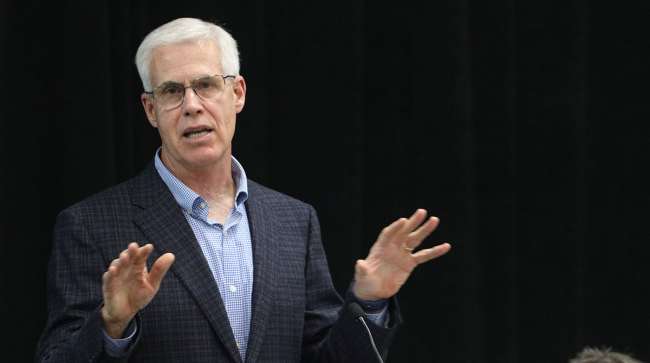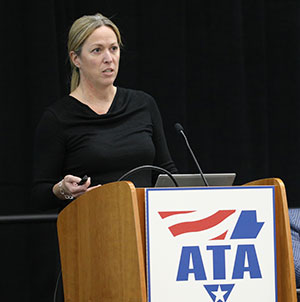Senior Reporter
California AB 5 Law: Many Challenges, No Easy Solutions

[Stay on top of transportation news: Get TTNews in your inbox.]
SAN DIEGO — The good news for motor carriers subject to the California AB 5 law is that legal experts say state prosecutors have not taken carriers to court to enforce the state’s controversial independent contractor misclassification law.
Not yet, that is, according to Gregory Feary, managing partner in Indianapolis-based Scopelitis, Garvin, Light, Hanson & Feary. But if, and when, the court battles begin, it likely will be the very large, high-profile and very small carriers not doing things right that will have targets on their backs, Feary said at an Oct. 23 session at American Trucking Associations’ Management Conference & Exhibition.
“Independent contractor law is a question of facts and law,” Feary said. “It’s also a mixed question of law and politics. Politics, even when it’s not in your face, it’s working right underneath. All those judges who are trying to balance all the factors have a political point of view.
Want more news? Listen to today's daily briefing above or go here for more info
“If the political point of view is we have to stop the big bad motor carriers from taking advantage of the little guys, then you’re going to see a lot of these subjective factors weighing in favor of employment.”
The AB 5 law, which originally was due to take effect in January 2020, was stalled for a little more than two years due to a federal lawsuit filed by the California Trucking Association, which argued that the law made it next to impossible for motor carriers to use independent contractors. The Supreme Court, however, earlier this year declined to hear the CTA challenge to the AB 5 law that uses a so-called ABC test designed to reclassify independent contractors into motor carrier employees.
The law was turned back July 1, and a federal district court preliminary injunction was lifted Aug. 29, Scopelitis partner Prasad Sharma said.
The AB 5 session here also included a number of complex legal strategies that could mean, but hardly guarantee, that motor carriers can successfully fight the effects of the independent contractor law. They range from “strategic dispatch” by having independent contractors spend more time working in states other than California, to paying independent contractors well so they can’t be portrayed in courtrooms as “downtrodden” employees.
“A lot of these solutions are being developed within the context of a very dynamic California law. But we don’t know if any of these solutions will work,” Feary said. “There is no silver bullet.”

Cohen speaks during the educational session. (John Sommers II for Transport Topics)
Scopelitis partner Shannon Cohen said that any suggested legislative fixes to the law that would favor truckers aren’t likely possible until next year when the state Legislature goes back into session.
“Certainly, stakeholders are looking at their options, they’re preparing legislative proposals, but there’s going to be no immediate fixes,” Cohen said. “Gov. [Gavin] Newsom said in August, ‘Be prepared for this because we’re going to be enforcing it.’ ”
“I think we all know that California’s AB 5 is fundamentally flawed in many ways,” said session panelist Glenn Fehribach, chief financial officer for World Group, a container holding company.
“Two ways it’s flawed is that it assumes independent contractors don’t want to own their own businesses, or be their own boss. Also, it assumes that all the independent contractors will somehow magically convert to employees. We all know what happens when you have bad assumptions.”
Fehribach called the challenges posed by the AB 5 law and potential solutions “so confusing that it’s hard for people to get their heads around.”





